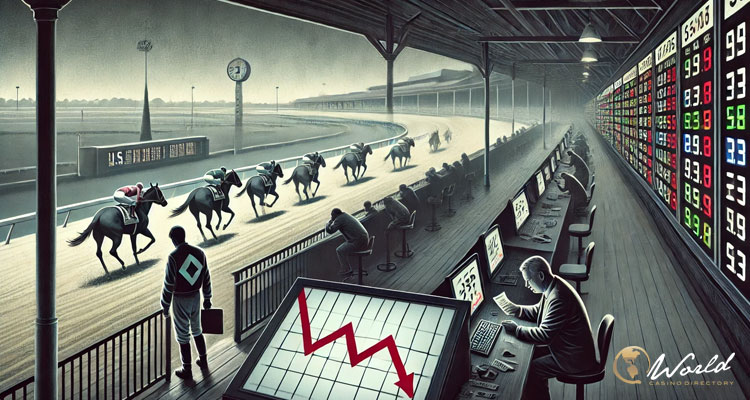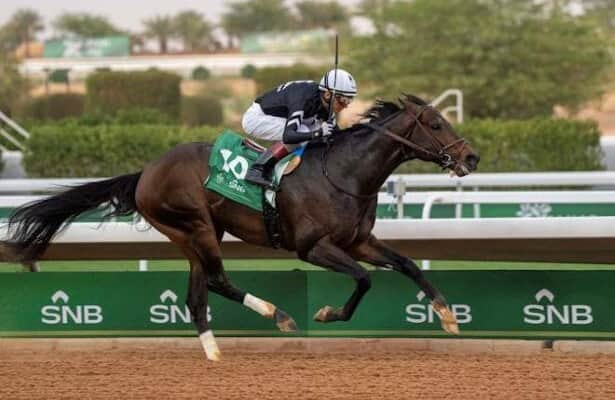US Horse Racing Wagering Falls for Third Year as Industry Faces Declining Participation and Revenue

For the third consecutive year, wagering on US horse racing has declined, with a total handle of $11.26 billion in 2024, representing a 3.35% drop from the previous year’s $11.65 billion. December marked the largest monthly decline, with wagering falling by 14.44% compared to the same period in 2023, according to Equibase. This downturn is a continuation of an ongoing trend affecting the sport.
Shrinking foal crop and industry impact:
Harness racing in the US also experienced a decline in wagering, with total bets falling by 7.23% to $1.47 billion. This represents a drop of $114.7 million from 2023. The sharpest drop occurred in the fourth quarter, which saw an 11.28% decrease compared to the same period in the prior year. These declines highlight the growing challenges faced by both horse and harness racing as they compete with other gambling markets.
In addition to wagering, other key metrics also fell in 2024. According to Paulick Report, the number of race days declined by 2.37%, while the total number of races and starts decreased by 2.82% and 2.63%, respectively. December’s steep decline in wagering came alongside a 4.33% drop in race days, a 6.38% reduction in races, and an 8.38% decrease in starts.
The challenges extend beyond declining participation. The average field size dropped slightly, from 8.18 in December 2023 to 8.01 in December 2024, compounding concerns about the future of the sport.
The declining foal crop remains a significant issue. Since 2008, the North American foal crop has shrunk by approximately 44%, from over 32,000 to an estimated 18,000 in 2024. This is the smallest crop since 1965, a year when nearly 19,000 foals were recorded. Despite similar foal numbers, today’s horses make fewer starts, averaging just 5.87 races per year compared to 10.22 in 1967.
The reduction in available horses and starts contributes to fewer races being run. In 2024, only about 30,852 races occurred in the US, a significant drop from over 52,000 races in 1967.
While purses saw a slight increase of 0.49%, reaching a record $1.31 billion, this improvement has not offset the broader declines. Notably, Equibase does not specify how much of these purses are generated from pari-mutuel wagering versus other sources like casino revenues, historical horse racing (HHR) machines, or slot machines.
Horse racing’s battle amid changing gambling trends:
The decline in horse racing wagering is also part of a larger trend where other forms of gambling, such as sports betting and casino games, are capturing attention. The introduction of HHR machines has been one method of boosting revenue for tracks, particularly in states like Virginia. These machines allow players to engage in slot-style gaming while supporting the horse racing industry.
Despite the benefits of HHR machines, they have not significantly converted casino patrons into horse race bettors. Industry insiders remain optimistic that online gambling markets may renew interest in horse racing, but for now, the numbers tell a different story.
Adding to the challenges, the closure of Freehold Raceway, the oldest racetrack in the US, reflects declining interest in the sport. The racetrack, which had been operating for 170 years, shut down due to decreasing attendance and revenue. Howard Bruno, the track’s general manager, stated, “Unfortunately, the operations of the racetrack cannot continue under existing conditions, and we do not see a plausible way forward.”
Although wagering on horse racing has struggled, traditional horse racing states like Kentucky have found success in alternative gaming revenue. Kentucky reported over $272 million in adjusted gross revenue from sportsbooks in 2024, with $2.3 billion wagered at online sportsbooks. These revenues indicate that diversification within the gambling sector might be key to sustaining the horse racing industry in the long run.
With declining metrics in traditional pari-mutuel wagering, industry stakeholders are looking to new strategies to revitalize interest in horse racing. Whether through digital platforms, enhanced betting technology, or integrating sports betting, the future of horse racing depends on adapting to an evolving gambling landscape.
Related
Saudi undercard: Straight No Chaser wins 1 of 5 graded…
Straight No Chaser arrived from America with the billing as one of the major equine attractions of this year’s Saudi Cup meeting. He duly dazzled in the Grou
American Reporter Snubs Kentucky Derby and California for Non-USA Horse…
Do you recall when Mike Repole gave an early warning to the American horse racing industry? The American businessman remarked, “You’re not a national sport
Saudi Cup Top Contenders: RATTLE N ROLL
In the days leading up to Saturday’s $20 million Saudi Cup at King Abdulaziz Racecourse in Riyadh, usracing.com is posting profiles of the leading cont
Saudi Cup: Forever Young Draws Outside, Romantic Warrior Inside
For a horse race billed as the richest in the world, there sure doesn’t seem to be much buzz around the $20 million Saudi Cup (G1) in Riyadh, Saudi Ara













